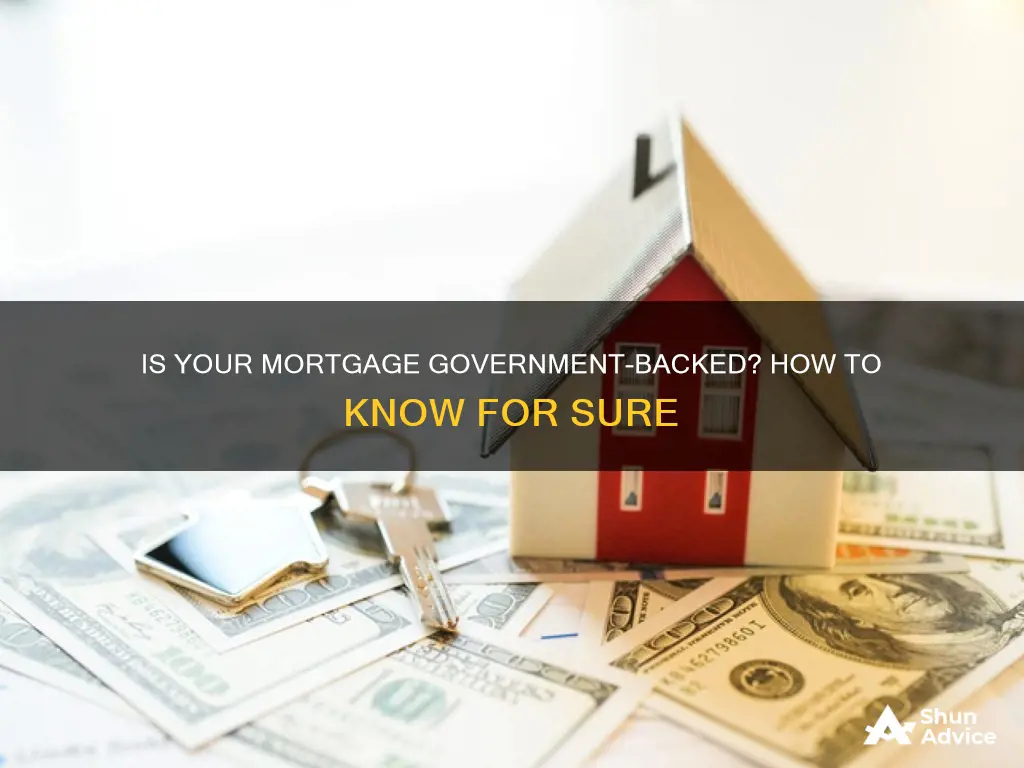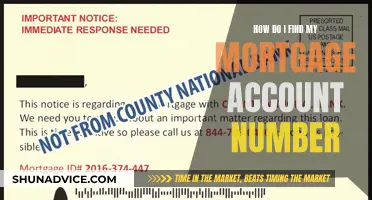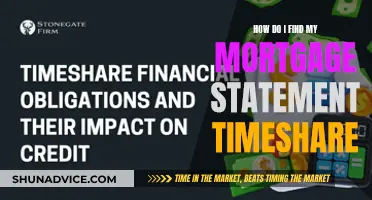
There are several ways to find out if your mortgage is government-backed. You can call your mortgage lender or send a written request to your mortgage provider. By law, your lender is required to provide you with the name, address, and telephone number of the person or entity that owns your loan. You can also use the Freddie Mac or Fannie Mae lookup tools online to see if your mortgage is backed by the government. Government-backed mortgages are insured by an agency of the federal government, making them a popular choice for those who might not qualify for conventional loans. They are offered by private lenders and are designed to make homeownership more accessible and affordable.
What You'll Learn

Check with your mortgage servicer or lender
If you want to find out whether your loan is a federally backed mortgage, you can contact your mortgage servicer or lender. You can do this by calling them or sending a written request. By law, your lender has an obligation to provide you with the name, address, and telephone number of the person who owns your loan, to the best of their knowledge.
You can find the number for your mortgage servicer on your monthly mortgage statement or coupon book. If you don't have this to hand, you can also look up the number online. Many mortgages are owned by Fannie Mae and Freddie Mac, and both offer a mortgage lookup tool on their website.
If you don't want to call or write to your mortgage servicer, you can use the Freddie Mac or Fannie Mae lookup tool to see if your mortgage is backed by the government.
Who Owns Your Mortgage? Trace Your Mortgage Backers
You may want to see also

Use the Freddie Mac or Fannie Mae lookup tool
If you want to find out whether your mortgage is government-backed, you can use the Freddie Mac or Fannie Mae lookup tool. Both of these tools are available online and can help you determine whether your mortgage is backed by the government.
To use the Freddie Mac lookup tool, you will need to provide your personal information, such as your name, address, and the last four digits of your Social Security Number. It is important to enter your information carefully, as spelling errors or small mistakes can lead to inaccurate results. If Freddie Mac owns your loan, a match will be found; if not, no match will be returned.
The Fannie Mae lookup tool works similarly. You will need to fill out a form with your personal information, including your first and last name, address, and the last four digits of your Social Security Number. If Fannie Mae owns your loan, the resulting page will show a match; if not, no match will be returned.
It is important to note that even if your mortgage is owned by Freddie Mac or Fannie Mae, you may not qualify for their mortgage relief solutions, such as forbearance plans or loan modifications. It is recommended to contact your mortgage company to verify the results and discuss your options.
In addition to using the lookup tools, you can also contact your mortgage servicer or lender directly to request information about the owner of your loan. They are obligated to provide you with the name, address, and telephone number of the owner of your loan to the best of their knowledge. This can be done through a written request, such as a Qualified Written Request or a Request for Information, or by calling them using the number provided on your monthly mortgage statement.
Finding Your Mortgage History: A Step-by-Step Guide
You may want to see also

Identify the type of loan: VA, USDA or FHA
There are three main types of government-backed mortgage loans: VA loans, USDA loans, and FHA loans. Each loan type has its own unique features, requirements, and advantages. Here's how to identify each loan type:
VA Loans
VA loans are backed by the U.S. Department of Veterans Affairs and are available for military personnel, veterans, and their spouses. They offer relaxed financial requirements compared to other mortgage types, with no monthly mortgage insurance, making them a cost-saving option. Additionally, VA loans have no maximum income limit and can be used for a wide range of property types.
USDA Loans
USDA loans are offered by the U.S. Department of Agriculture and are designed for homebuyers in designated rural areas. They have no down payment requirement, making them attractive to buyers with limited funds. While there is no set loan maximum limit, the loan amount depends on the borrower's qualifications and financial situation. USDA loans also have specific property requirements, such as the need to be the borrower's primary residence and a single-family home.
FHA Loans
FHA loans are insured by the Federal Housing Administration and are popular among first-time homebuyers due to their lower down payment and closing cost requirements. FHA loans also have more flexible credit criteria, allowing borrowers with lower credit scores to qualify. However, FHA loans have a maximum loan limit that varies by county and require a Mortgage Insurance Premium (MIP) at closing and as part of the monthly payment.
Recognizing Tracker Mortgages: What You Need to Know
You may want to see also

Understand the pros and cons of government-backed mortgages
Government-backed mortgages are home loans that are fully or partially insured by a government agency. They are obtained through a private lender, such as a bank, but insured by one of three federal government agencies: the Federal Housing Administration (FHA), the U.S. Department of Agriculture (USDA), or the Department of Veterans Affairs (VA). Government-backed mortgages can make homeownership more accessible and affordable for individuals and families, especially those with bad credit or low down payment savings. They often have lower down payment requirements and more flexible credit criteria than conventional loans. For example, VA and USDA loans don't require any down payment, while FHA loans ask for just 3.5% down.
However, eligibility requirements for government-backed mortgages can be strict, and they often come with restrictions on the type of property that can be purchased. Additionally, government-backed mortgages may require upfront fees and mandatory mortgage insurance. For example, FHA and USDA loans require ongoing monthly fees.
One of the biggest advantages of government-backed mortgages is that they are generally easier to qualify for than other types of mortgages. They are designed to promote homeownership, particularly for low- and moderate-income households, first-time homebuyers, veterans, and military personnel. The government backing allows lenders to take greater risks by approving borrowers who might not otherwise be eligible.
On the other hand, conventional loans can be more cost-effective for borrowers with high credit scores, as they often offer lower interest rates and lower private mortgage insurance (PMI) rates than government-backed loans. Conventional mortgages can also be used to buy a wider variety of property types, including vacation homes and investment properties.
Overall, both conventional and government-backed loans have their advantages, and the best choice will depend on an individual's circumstances and goals. It is important for prospective homebuyers to understand the pros and cons of each type of mortgage before making a decision. To find out if your mortgage is government-backed, you can contact your mortgage lender or servicer or use an online lookup tool such as Freddie Mac or Fannie Mae.
Finding Non-Recourse Mortgages: What You Need to Know
You may want to see also

Know the eligibility requirements
To know the eligibility requirements for a government-backed mortgage, it is important to understand the different types of government-backed loans available. The three most common federally-funded loans are:
- VA loans: These are available for veterans, military personnel, and their spouses. They do not require any down payment and there is no monthly mortgage insurance, resulting in substantial savings over the term of the loan. VA loans are also assumable, meaning they can be transferred to someone else if the new borrower is eligible.
- USDA loans: These are designed for rural homebuyers and may have specific location requirements.
- FHA loans: These are backed by the Federal Housing Administration and are geared towards low- and moderate-income households, especially first-time homebuyers. FHA loans often have lower down payment and closing cost requirements than conventional loans and are more accessible to those with lower credit scores.
Each type of government-backed mortgage has its own eligibility requirements regarding down payment, credit score, and debt-to-income ratio (DTI). For example, while a credit score of 580 is generally considered the threshold for qualifying for an FHA loan, individual lenders may set their own standards and require a higher score.
It is important to note that government-backed mortgages are not direct loans, and you must apply through a private mortgage lender that offers these types of loans. The eligibility requirements for government-backed mortgages are generally more lenient than those for conventional loans, making homeownership more accessible and affordable for individuals and families.
Strategies to Overcome Mortgage Debt Problems
You may want to see also
Frequently asked questions
You can find out if your mortgage is government-backed by using the Freddie Mac or Fannie Mae lookup tools online. You can also call your loan servicer or send a written request to your mortgage provider to ask. They are required by law to provide you with this information.
Government-backed mortgages are insured by an agency of the federal government, which reduces the risk for lenders. This means that lenders can offer more favourable terms, such as lower down payments, more flexible credit requirements and competitive interest rates.
The three most common federally-funded loans are VA loans, USDA loans, and FHA loans. VA loans are available for veterans and military personnel and do not require mortgage insurance. USDA loans are for low-to-moderate-income individuals in designated rural areas. FHA loans are backed by the Federal Housing Administration and have lower down payments and closing costs than conventional loans.







